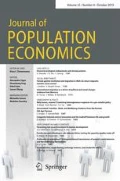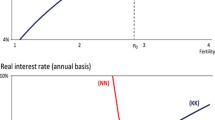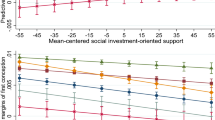Abstract.
This paper investigates how social security interacts with growth and growth determinants (savings, human capital investment, and fertility). Our empirical investigation finds that the estimated coefficient on social security is significantly negative in the fertility equation, insignificant in the saving equation, and significantly positive in the growth and education equations. By contrast, the estimated coefficient on growth is insignificant in the social security equation. The results suggest that social security may indeed be conducive to growth through tipping the trade-off between the number and quality of children toward the latter.
Similar content being viewed by others
Author information
Authors and Affiliations
Corresponding author
Additional information
All correspondence to Junsen Zhang. We would like to thank the editor, two anonymous referees, Jim Davies, Frank Denton, Se-Jik Kim, and Mike McAleer for helpful comments and suggestions. Any remaining omissions and errors are the authors’ responsibility. Responsible editor: Alessandro Cigno.
Rights and permissions
About this article
Cite this article
Zhang, J., Zhang, J. How does social security affect economic growth? Evidence from cross-country data. J Popul Econ 17, 473–500 (2004). https://doi.org/10.1007/s00148-004-0198-x
Received:
Accepted:
Issue Date:
DOI: https://doi.org/10.1007/s00148-004-0198-x




